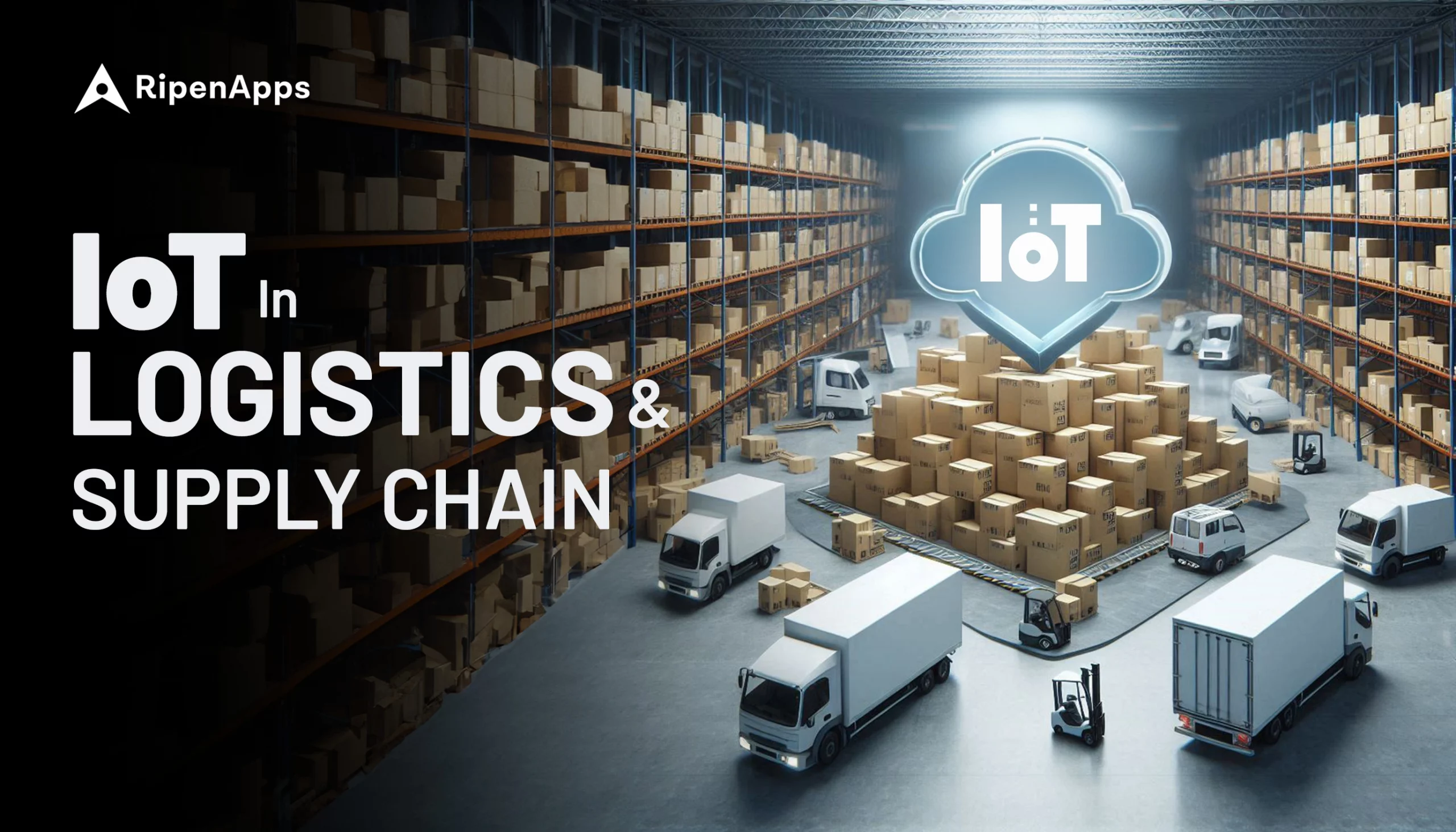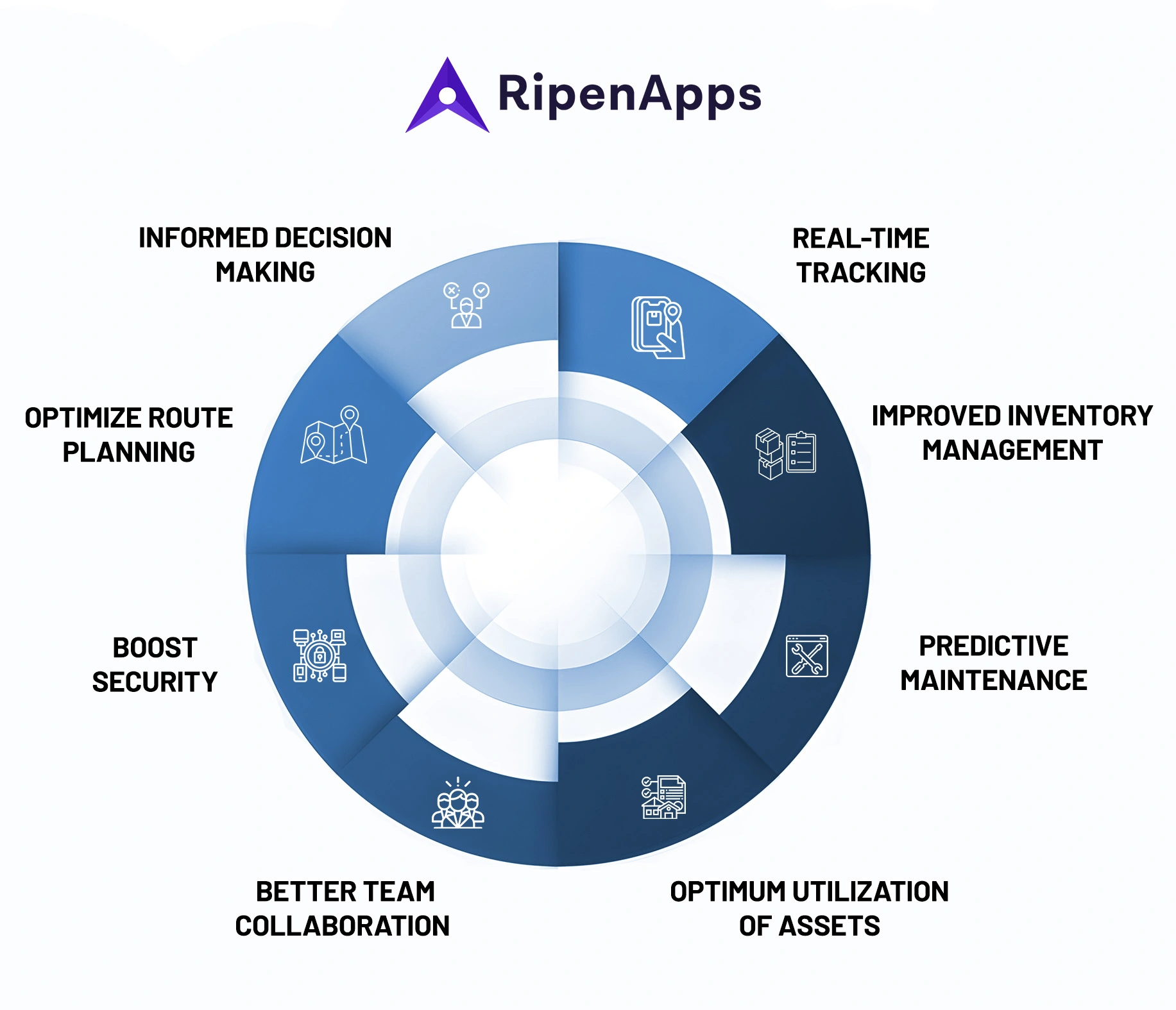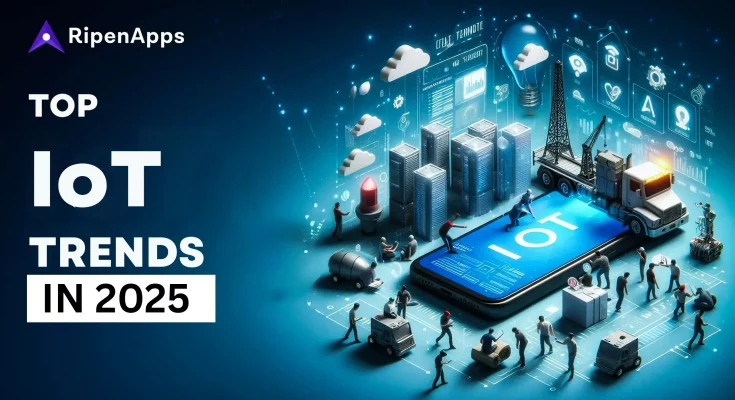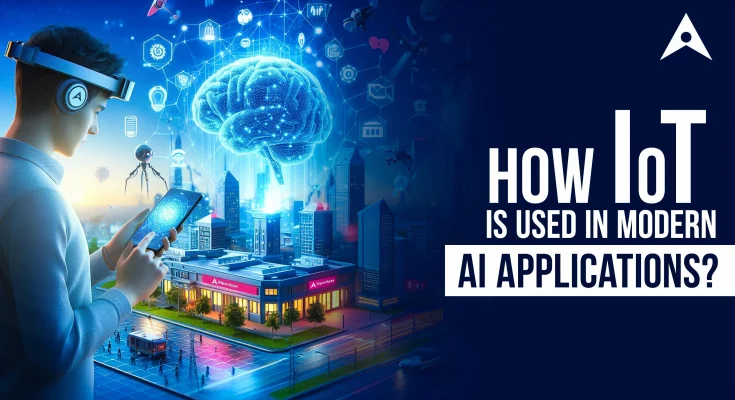Are you a business owner struggling with optimizing logistics, delayed deliveries, higher operational costs, or inefficient tracking? What if a technology like IoT in Logistics can help you eliminate these business challenges and enhance your overall efficiency?
The Internet of Things or IoT is influencing the logistics industry to a great extent. According to future market insights reports, the global market size of IoT in logistics is expected to be valued at US$ 50.26 million in 2024. The substantial ripple in the logistics trade is due to rapid technological advancement.
In this blog, you are going to get a bigger picture of how business owners can make the best use of Internet of Things (IoT) technologies to revolutionize their business logistics and supply chain management process.
Table of Contents
What is IoT in Logistics and Supply Chain Management?
The Internet of Things or IoT is a network of interconnected devices that allows you to easily communicate and share data over the internet. When it comes to logistics and supply chain management, IoT includes various smart devices such as sensors and software to collect and analyze sensible data in real time. You can easily track your assets, monitor external environmental conditions, and optimize routes which will increase overall business operational efficiency and productivity.
IoT devices can be installed in your business vehicles such as trucks to keep a close eye on fuel consumption, easily track vehicle locations, and detect mechanical issues. You can also place IoT sensors in warehouses to easily monitor temperature, humidity, and various inventory levels. It also ensures that the inventory or stock is stored under the best optimal conditions.
However, for this, you need to have cutting-edge digital solutions. Connecting with a recognized logistics app development company can help you build an app that seamlessly connects with your IoT system.
The collected data from these IoT devices provides various valuable insights that help business owners make more informed decisions. There are several advantages to it such as better decisions, reduced downtime, and enhanced overall productivity.
The emerging technologies enable real-time visibility and automation. Therefore, IoT is changing logistics into an efficient and responsive system.
Why Integration of IoT in Logistics is Crucial?
The demand for integration of IoT in transportation and logistics is due to the following reasons:
- Smart IoT sensors in warehouses and trucks provide real-time insights.
- IoT-enabled cargo containers provide insightful information about inventory management, optimizing routes, vehicle maintenance, etc.
- With the help of RFID tags, it automates inventory management.
- Allows organizations to track shipments, improve security, and predict possible issues.
Benefits of IoT in Logistics For Businesses
1. Real-Time Tracking and Visibility
One of the significant benefits of IoT in logistics and supply chain management is that it allows tracking of shipments in real time. Nowadays, there are IoT-enabled GPS devices that allow businessmen to seamlessly monitor the locations of their goods. This allows businesses with greater transparency which allows them to easily address potential delays.
The real-time tracking of inventory enhances overall customer satisfaction and allows business owners to provide accurate delivery estimates. With the help of the latest emerging technologies, your customers can easily receive notifications about the status of their shipments which leads to better communication and trust between both parties.
2. Improves Your Inventory Management
Inventory Management is one of the most crucial aspects of supply chain management. It can significantly improve the accuracy and efficiency of your business. Different IoT sensors installed in warehouses can easily track stock levels in real time. Therefore, it allows various businesses to not overstock the products or store an extra item.
The automated IoT system can seamlessly track the movements of goods within the warehouse. It also ensures that your business products are stored efficiently.
Business owners are making the best use of RFID tags and barcodes to track every item. In this way, they can get accurate inventory records. Also, the chances of errors such as misplaced items or stock discrepancies can be reduced.
Moreover, it’s equally crucial to follow useful tips to build an IoT-based app to enhance your inventory management and have the desired results.
3. Predictive Maintenance
Fleet management is one of the crucial components of logistics and supply chain management. The Internet of Things is becoming a helping hand for several businesses to reduce the overall risk of vehicle breakdowns.
The installed IoT sensors can easily track the performance of the engine, fuel levels, pressure of tires, and other essential indicators. However, if any issues arise, the IoT system can send alerts to maintenance teams before the occurrence of a huge breakdown.
To make the best use of installed sensors, you can reach out to top mobile app development companies in India. They will help you to harness the capabilities of IoT in logistics to drive success and innovation.
Apart from this, one of the advantages of identifying problems is that it can help you avoid costly repairs which minimizes overall vehicle downtime. Moreover, it also ensures that the fleets remain operational for a long period. This helps you to keep proper maintenance and save costs by keeping delivery schedules on track.
4. Utilize Your Assets in The Best Possible Way
With the help of IoT technologies, supply chain and logistics managers can optimize their fleets as it brings much-needed connectivity. If you are making the best use of technologies, you can plan your routes, identify delays in asset delivery, monitor asset efficiency, and streamline your operations to increase delivery numbers.
Different technologies such as Machine Learning(ML) and AI-based systems help you to provide relevant data to carry out predictive analytics. Another advantage of IoT in transportation and logistics is that it allows you to maintain fleets, manage cargo, monitor vehicles, and carry out environment-conscious operations.
Therefore, we can say that the Internet of Things plays a crucial role in ensuring security, visibility, savings, reducing downtime, and helping you to optimize your assets.
5. Better Cooperation Between Departments and Branches
Another crucial benefit of IoT in logistics is better cooperation between different departments. The management of logistics and supply chain processes especially in large organizations is extremely complex. However, it can be effectively optimized with the proper digital infrastructure that works on IoT technologies.
The collected information from smart devices within an organization property can be processed and stored in a data center which is owned by a cloud service provider. By this, huge data can be easily available to all the working employees.
Read Also: An Exclusive Logistics App Development Guide: Process, Benefits, & Challenges
6. Boost Security and Ensures Risk Management
In today’s world, security is the top priority for businesses, especially for those who deal with transporting valuable items. However, you need to learn how to use IoT security challenges effectively.
In this scenario, the emergence of IoT allows real-time monitoring of assets to enhance security. For instance: Businesses can install IoT-based devices on shipping containers to seamlessly detect unauthorized access. One of the perks is that in case of a security breach, entrepreneurs can instantly get notifications and take required actions to mitigate the overall risk.
Apart from this, the IoT-enabled cameras and sensors enable us to easily monitor warehouses and distribution centers. Thus, it ensures that your items are stored securely for a long period.
7. Optimized Route Planning
One of the major challenges that businesses face is inefficient route planning. It can hamper the overall business due to delays, wasted fuel, and increased operational costs. Therefore, the application of IoT in logistics can optimize route planning by predicting weather conditions, traffic, and other parameters that directly affect delivery times.
For this, businesses can install GPS systems equipped with IoT to adjust their routes accordingly. Apart from this, it leads to cost-saving and following a more sustainable approach in the logistics sector.
8. Helps You To Take The Right Decision
You can use IoT devices to generate data and get valuable insights to make an informed decision. Business owners can easily analyze data for delivery times, and fuel consumption to take necessary steps for improvements.
Thus, following a data-driven approach can allow businesses to make decisions in the best possible way. Based on it, they can enhance efficiency, reduce cost, and enhance their customer’s experience.
Conclusion
The Internet of Things is changing logistics and supply chain management to a great extent. It is one of the great opportunities for businesses to optimize operations, improve efficiency, and minimize overall costs.
The IoT offers a plethora of advantages from real-time tracking to predictive maintenance that can help you to stay ahead in the fast-paced competitive world.
With the evolving technologies, the application of IoT in logistics will increase even more. However, incorporating IoT devices into your systems can be a challenging task. Also, to utilize IoT sensors in the best possible way, you need a powerful app.
So, feel free to seek help from a well-recognized IoT app development company to build a robust app to make the best use of IoT sensors in warehouses and business vehicles. It will give you a competitive edge and take your business to the next level.
Frequently Asked Questions
Q1. What is IoT in logistics?
IoT in logistics refers to the integration of smart sensors and connected systems to ensure seamless communication and data sharing across the network. It comes with several advantages such as monitoring vehicle performance, improved route efficiency, reduced downtime, and timely delivery of goods.
Q2. What are the applications of IoT in logistics and supply chains?
IoT in logistics and supply chain management has multiple applications such as improved fleet management, real-time tracking, enhanced warehouse automation, and much more. There are several advantages to it such as inventory management, reduced operational cost, and boosted overall productivity.
Q3. How big is the IoT logistics market?
The global market of IoT in logistics is growing rapidly. The increasing demand is driven by smarter and more efficient supply chain solutions. By the end of 2033, the market size of IoT in logistics is expected to grow to $146.1 billion. It is all due to the widespread adoption of IoT across various industries.
Q4. What is the future of IoT in the logistics industry?
Due to continuous advancements in automation and real-time analytics, the future of IoT in the logistics industry is promising. The integration of IoT in logistics plays a crucial role in automating warehouses, delivery vehicles, etc. This will enhance connectivity and allow faster decision-making.












 India
India USA
USA Australia
Australia Canada
Canada UK
UK UAE
UAE
